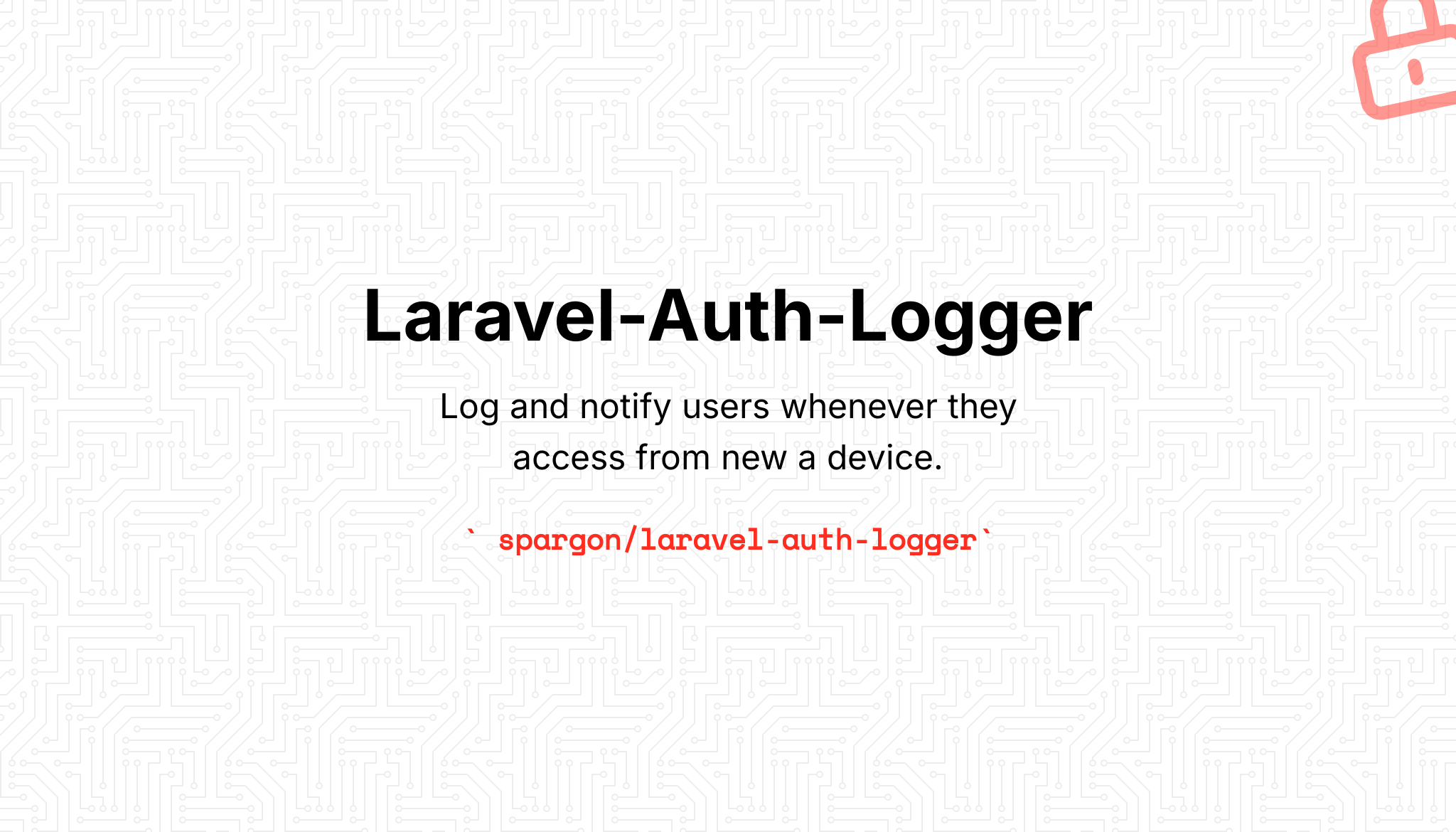Laravel Auth Logger stores user authentication logs and sends out notifications whenever a user logs in from a new system.
Laravel Auth Logger requires PHP 7.0+ and currently supports Laravel 7, 8 & 9.
You can install the package via composer:
composer require spargon/laravel-auth-loggerAfter installing the Laravel-Auth-Logger package, you need run the install command which will take care of everything you need to get started. Type the following artisan command in your console:
php artisan auth-logger:installThis will publish the config/auth-logger.php file, publish the necessary migration files and ask you for permission to run said migrations.
Once installed, you need to add the AuthLogable and Notifiable traits to your authenticatable model (by default its, App\Models\User model). These traits provides you with various methods to get the data generated by the auth logger, such as last login time, last login IP address, and sets the channels to notify the user when they login from a new device:
use Illuminate\Notifications\Notifiable;
use Spargon\AuthLogger\AuthLogable;
use Illuminate\Foundation\Auth\User as Authenticatable;
class User extends Authenticatable
{
use Notifiable, AuthLogable;
}Get all the authentication logs for a user:
User::find(1)->auths;Get the user's last login info (includes the current session if the user is logged in):
User::find(1)->lastLoginAt(); [or] auth()->user()->lastLoginAt()
User::find(1)->lastLoginIp(); [or] auth()->user()->lastLoginIp()Get the user's previous login time & ip address (ignoring the current login log):
User::find(1)->previousLoginAt(); [or] auth()->user()->previousLoginAt()
User::find(1)->previousLoginIp(); [or] auth()->user()->lapreviousLoginIpstLoginAt()Notifications may be sent on the mail, or/and the slack channels. By default AuthLogger will send a notification via the mail driver (provided you have enabled notify in config/auth-logger.php file).
You can define notifyAuthLoggerVia method on the User's Model to determine which channels the notification should be sent to:
/**
* The Auth Logger notifications delivery channels.
*
* @return array
*/
public function notifyAuthLoggerVia()
{
return ['mail', 'slack'];
}Note: If you want to use the slack notification channel, you need to install the laravel/slack-notification-channel package first otherwise your app will throw a Driver not supported error. Be sure to go through the Laravel docs for Slack Pre-requisites here.
You also need to generate a Slack Incoming Webhook from here and then add the generated webhook to your authenticatable model (usually the User) as such:
/**
* Route notifications for the Slack channel.
*
* @param \Illuminate\Notifications\Notification $notification
* @return string
*/
public function routeNotificationForSlack($notification)
{
return 'https://hooks.slack.com/services/T01D8HUCU4.....'; // replace this with the webhook you receive from Slack
}In config/auth-logger.php file, you can customize the name of the Sender, the Channel to receive the notifications on & the Icon to show on the notification.
By default all slack messages will be sent to the #general channel.
| Slack Sample Image | Mail Sample Image |
|---|---|
 |
 |
Of course you can disable notifications by setting the notify option in your config/auth-logger.php configuration file to false:
'notify' => env('AUTH_LOGGER_NOTIFY', false),This package uses the jenssegers/agent package to parse the user's user-agent when sending the alert notification. Take a look at their docs here to learn how to use it in your app (ex: in your logs table).
You may clear the old authentication log records using the auth-logger:clear Artisan command:
php artisan auth-logger:clear
Records that are older than the number of days specified in the older option in your config/auth-logger.php will be deleted when you run the above command:
'older' => 31,You can publish the New Device Alert Email view using the command below:
php artisan vendor:publish --tag=auth-logger-viewsYou can also publish the translations file used by the auth-logger using the command below:
php artisan vendor:publish --tag=auth-logger-translationsThese are optional files. You don't need to publish them for the package to work. They exist only for cases where you want to make any changes to the files yourself.
If you want to change the name of the auth-logger table, you can do so by changing the vaule of table_name in the config/auth-logger.php file (this step is optional - you must also update the table name in the migrations/database to reflect the same).
Currently we are experimenting with an implention of Location Tagging (using GeoIP package from Torann). You can checkout the geoip branch to play around with it or get the dev-geoip release from packagist using composer require spargon/laravel-auth-logger:dev-geoip
This is an experimental release of location tagging. Accuracy is not 100% guaranteed. Use it at your own risk. PS> This experimental version does not contain the install command.
composer testPlease see CHANGELOG for more information on what has changed recently.
Please see CONTRIBUTING for details.
Please review our security policy on how to report security vulnerabilities.
The MIT License (MIT). Please see License File for more information.





